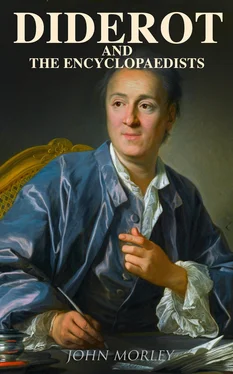The same kind of connivance was practised to the advantage of other branches of the opposition. Thirty years before this, the organ of the Jansenist party was peremptorily suppressed. The police instituted a rigorous search, and seized the very presses on which the Nouvelles Ecclésiastiques was being printed. But the journal continued to appear, and was circulated, just as regularly as before.[145]
The history of the policy of authority towards the Encyclopædia is only one episode in the great lesson of the reign of Lewis XV. It was long a common mistake to think of this king's system of government as violent and tyrannical. In truth, its failure and confusion resulted less from the arbitrariness of its procedure, than from the hopeless absence of tenacity, conviction, and consistency in the substance and direction of its objects. And this, again, was the result partly of the complex and intractable nature of the opposition with which successive ministers had to deal, and partly of the overpowering strength of those Asiatic maxims of government which Richelieu and Lewis XIV. had invested with such ruinous prestige. The impatience and charlatanry of emotional or pseudo-scientific admirers of a personal system blind them to the permanent truth, of which the succession of the decrepitude of Lewis XV. to the strength of his great-grandfather, and of the decrepitude of Napoleon III. to the strength of his uncle, are only illustrations.
The true interest of all these details about a mere book lies in the immense significance of the movement of political ideas and forces to which they belong. The true interest of all history lies in the spectacle which it furnishes of the growth and dissolution, the shock and the transformation, incessantly at work among the great groups of human conceptions. The decree against the Encyclopædia marks the central moment of a collision between two antagonistic conceptions which disputed, and in France still dispute, with one another the shaping and control of institutions. One of these ideas is the exclusion of political authority from the sphere and function of directing opinion; it implies the absolute secularisation of government. The rival idea prompted the massacre of St. Bartholomew, the dragonnades, the revocation of the Edict of Nantes, and all the other acts of the same policy, which not only deprived France of thousands of the most conscientious and most ingenious of her sons, but warped and corrupted the integrity of the national conscience. It is natural that we should feel anger at the arbitrary attempt to arrest Diderot's courageous and enlightened undertaking. Yet in truth it was only the customary inference from an accepted principle, that it is the business or the right of governments to guide thought and regulate its expression. The Jesuits acted on this theory, and resorted to repressive power and the secular arm whenever they could. The Jansenists repudiated the principle, but eagerly practised it whenever the turn of intrigue gave them the chance.
An extraordinary and unforeseen circumstance changed the external bearings of this critical conflict of ideas. The conception of the duties of the temporal authority in the spiritual sphere had been associated hitherto with Catholic doctrine. The decay of that doctrine was rapidly discrediting the conception allied with it. But the movement was interrupted. And it was interrupted by a man who suddenly stepped out from the ranks of the Encyclopædists themselves. Rousseau from his solitary cottage at Montmorency (1758) fulminated the celebrated letter to D'Alembert on Stage Plays. The article on Geneva in the seventh volume of the Encyclopædia had not only praised the pastors for their unbelief; it also assailed the time-honoured doctrine of the churches that the theatre is an institution from hell and an invention of devils. D'Alembert paid a compliment to his patriarch and master at Ferney, as well as shot a bolt at his ecclesiastical foes in Paris, by urging the people of Geneva to shake off irrational prejudices and straightway to set up a playhouse. Rousseau had long been brooding over certain private grievances of his own against Diderot; the dreary story has been told by me before, and happily need not be repeated.[146] He took the occasion of D'Alembert's mischievous suggestion to his native Geneva, not merely to denounce the drama with all the force and eloquence at his command, but formally to declare the breach between himself and Diderot. From this moment he treated the Holbachians—so he contemptuously styled the Encyclopædists—as enemies of the human race and disseminators of the deadliest poisons.
This was no mere quarrel of rival authors. It marked a fundamental divergence in thought, and proclaimed the beginning of a disastrous reaction in the very heart of the school of illumination. Among the most conspicuous elements of the reaction were these: the subordination of reason to emotion; the displacement of industry, science, energetic and many-sided ingenuity, by dreamy indolence; and finally, what brings us back to our starting-point, the suppression of opinions deemed to be anti-social by the secular arm. The old idea was brought back in a new dress; the absolutist conception of the function of authority, associated with a theistic doctrine. Unfortunately for France, Rousseau's idea prospered, and ended by vanquishing its antagonist. The reason is plain. Rousseau's idea exactly fitted in with the political traditions and institutions of the country. It was more easily and directly compatible than was the contending idea, with that temper and set of men's minds which tradition and institutions had fixed so disastrously deep in the national character.
The crisis of 1758–59, then, is a date of the highest importance. It marks a collision between the old principle of Lewis XIV., of the Bartholomew Massacre, of the revocation of the Edict of Nantes, and the new rationalistic principle of spiritual emancipation. The old principle was decrepit, it was no longer able to maintain itself; the hounds were furious, but their fury was toothless. Before the new principle could achieve mastery, Rousseau had made mastery impossible. Two men came into the world at this very moment, whom destiny made incarnations of the discordant principles. Danton and Robespierre were both born in 1759. Diderot seems to have had a biblical presentiment, says Michelet. "We feel that he saw, beyond Rousseau, something sinister, a spectre of the future. Diderot-Danton already looks in the face of Rousseau-Robespierre."[147]
A more vexatious incident now befell the all-daring, all-enduring Diderot, than either the decree of the Council or the schism of the heresiarch at Montmorency. D'Alembert declared his intention of abandoning the work, and urged his colleague to do the same. His letters to Voltaire show intelligibly enough how he brought himself to this resolution. "I am worn out," he says, "with the affronts and vexations of every kind that this work draws down upon us. The hateful and even infamous satires which they print against us, and which are not only tolerated, but protected, authorised, applauded, nay, actually commanded by the people with power in their hands; the sermons, or rather the tocsins that are rung against us at Versailles in the presence of the king, nemine reclamante ; the new intolerable inquisition that they are bent on practising against the Encyclopædia, by giving us new censors who are more absurd and more intractable than could be found at Goa; all these reasons, joined to some others, drive me to give up this accursed work once for all." He cared nothing for libels or stinging pamphlets in themselves, but libels permitted or ordered by those who could instantly have suppressed them, were a different thing, especially when they vomited forth the vilest personalities. He admitted that there were other reasons why he was bent on retiring, and it would appear that one of these reasons was dissatisfaction with the financial arrangements of the booksellers.[148]
Читать дальше












